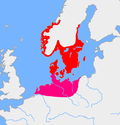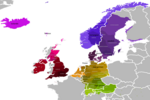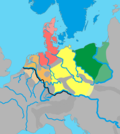All Indo-European verbs that passed into Germanic as functioning verbs were strong, apart from the small group of irregular verbs discussed below. The...
29 KB (2,932 words) - 19:25, 10 June 2024
the Germanic languages, A strong verb is a verb that marks its past tense by means of changes to the stem vowel. The majority of the remaining verbs form...
125 KB (12,202 words) - 03:38, 5 June 2024
In the Germanic languages, weak verbs are by far the largest group of verbs, and are therefore often regarded as the norm (the regular verbs). They are...
60 KB (5,117 words) - 07:44, 14 March 2024
verbs had the voiceless alternants. Alternation between the present and past of strong verbs remained common and was not levelled in Proto-Germanic,...
130 KB (12,145 words) - 15:04, 7 June 2024
conjugation of Germanic strong verbs such as sing/sang/sung. While Germanic umlaut has had important consequences for all modern Germanic languages, its...
54 KB (5,347 words) - 09:26, 29 May 2024
tense. The vast majority of verbs in all Germanic languages are weak; the remaining verbs with vowel ablaut are the strong verbs. The distinction has been...
92 KB (9,397 words) - 01:28, 10 June 2024
a limited number of verbs, or if it requires the specification of more than one principal part (as with the German strong verbs), views may differ as...
18 KB (2,546 words) - 04:15, 31 May 2024
West Germanic is the preservation of grammatischer Wechsel in most verbs, particularly in Old High German. This implies the same for West Germanic, whereas...
56 KB (4,765 words) - 20:10, 30 May 2024
with OHG lembir The development of Class III weak verbs into a relic class consisting of four verbs (*sagjan "to say", *hugjan "to think", *habjan "to...
10 KB (1,100 words) - 23:36, 10 May 2024
most primary verbs were simple root verbs. Some imperfectives with the ye-suffix survived into Proto-Germanic, as did one nasal-infix verb (*standaną "to...
82 KB (7,772 words) - 08:50, 2 June 2024




